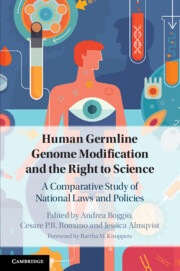 Human Germline Genome Modification and the Right to Science
Human Germline Genome Modification and the Right to Science from Part II - Europe
Published online by Cambridge University Press: 15 November 2019
In the Federal Republic of Germany, intentional alteration of the genome of germline cells and embryos is prohibited by criminal law. This ban is the result of legislation that was adopted more than twenty-five years ago. However, the rapid emergence of genome manipulation techniques, coupled with recent technological developments, is increasingly exposing the senescence of the regulatory framework. With the advent of genome editing, there has been a shift in the national debate on the use of genetic engineering. Until recently, the discussion regarding the use of genome altering methods had been more about the application of genetic engineering to plants (so-called ‘green genetic engineering’) than to humans (so-called ‘red genetic engineering’). After all, green genetic engineering has been present in the fields for years, and sometimes even on the plate, while most red genetic engineering efforts have been unspectacular cell biology basic research, slowed down by both technical and legal hurdles. However, the emergence of more precise, safer and more predictable genome editing methods has now brought the issue into German public discourse and, as evidenced by this volume, around the world.
To save this book to your Kindle, first ensure no-reply@cambridge.org is added to your Approved Personal Document E-mail List under your Personal Document Settings on the Manage Your Content and Devices page of your Amazon account. Then enter the ‘name’ part of your Kindle email address below. Find out more about saving to your Kindle.
Note you can select to save to either the @free.kindle.com or @kindle.com variations. ‘@free.kindle.com’ emails are free but can only be saved to your device when it is connected to wi-fi. ‘@kindle.com’ emails can be delivered even when you are not connected to wi-fi, but note that service fees apply.
Find out more about the Kindle Personal Document Service.
To save content items to your account, please confirm that you agree to abide by our usage policies. If this is the first time you use this feature, you will be asked to authorise Cambridge Core to connect with your account. Find out more about saving content to Dropbox.
To save content items to your account, please confirm that you agree to abide by our usage policies. If this is the first time you use this feature, you will be asked to authorise Cambridge Core to connect with your account. Find out more about saving content to Google Drive.